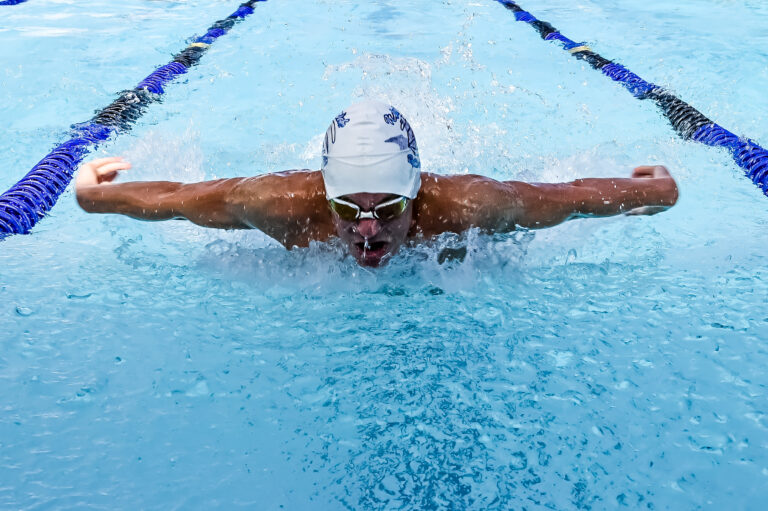Dissecting Some Differences Between Australian and US Swimming
One Australian Olympian’s Perspective
For me it’s always an emotional rollercoaster to watch an Olympics; it brings back so many memories from my own days on the Australian Olympic swim team (1992, 1996, 2000).
This year, the rollercoaster was particularly up and down, as the Australian swim team, boasting numerous world champions and world record holders, turned in what the pundits have deemed its worst Olympic performance since 1992; that is: the fewest medals. While, at the other end of the emotional spectrum, the US swim team had one of its most successful Olympics ever.
Having lived in America for the last 20 years, I cheered loudly for the Americans and the Australians in every race (although I admit to actually screaming at the TV when Kyle Chalmers won his gold).
Much has been said about the Aussie swim team’s “disappointing” performance. Many have questioned the team’s “mental toughness,” while other camps point fingers at team management, coaching and funding issues. Even Michael Phelps weighed in on the Australians’ difficulties, commenting on the mental and emotional stamina required to produce Olympic medals.
My heart breaks for the athletes when I read these headlines. I know from personal experience what it feels like to fall short of expectations at the Olympics, both my own and my country’s. I was ranked first in the world in 1995 but ended up 5th at the 1996 Olympics after qualifying second into the final. Yes, I was one of the “disappointments” who was expected to medal that year.
I don’t have to know the swimmers personally to understand – and relive – what they are feeling. It’s a singular feeling for every Olympian who doesn’t reach the potential they hoped for themselves. The disappointment lessens with time, but it never completely goes away.
What I know now, with a couple of decades of perspective is, you can’t realistically lump the results of individual swimmers together and place blame in any one place. And while I understand that an exploration of the funding of Australian swimming is necessary, you won’t find an explanation for the Rio results there, because let’s face it: you can’t buy Olympic Medals.
In case my voice can make a difference to even one swimmer, one journalist, one sports administrator, or one armchair critic in Australia, I’d like to contribute a few observations on differences between swimming in Australia and America and some thoughts on the types of cultural, social and institutional changes that could lead to improved outcomes for Australian swimmers.
First Let’s Address the Elephant in the Room
Do Australian swimmers lack mental toughness?
There is no doubt that for some of the Australian swimmers in Rio, inadequate mental preparation was some of the problem. It’s hard to mentally prepare for that level of pressure: competing against the finest athletes of your generation and knowing you have just one day, out the last four years and the next four, for all your stars to align. In 1996 I let the hype get to me; the drug scandals, the predictions, the negative Australian media coverage before my swim. It was a lot to try to put out of my mind and I failed. But I know the mental angle was only part of the story of my result.
prepare for that level of pressure: competing against the finest athletes of your generation and knowing you have just one day, out the last four years and the next four, for all your stars to align. In 1996 I let the hype get to me; the drug scandals, the predictions, the negative Australian media coverage before my swim. It was a lot to try to put out of my mind and I failed. But I know the mental angle was only part of the story of my result.
Elite athletes are competitors by definition and by nature. The pressure of the competition alone is rarely to blame. Each athlete has their own story, their own trials and tribulations, both physical and mental that contribute to their result. To suggest that any athlete performing at this level is “mentally weak” is unfair; it’s an attempt to give an oversimplified explanation to an undesired outcome. Simply making it to the Olympic Games requires an overabundance of mental and emotional stamina, and it takes even more to compete in them, regardless of results.
Do other peripheral pressures come into play that contribute to mental mistakes? Emphatically, yes. Let’s take a look at some of them.
How Are the Pressures Different for Australian and American swimmers?
Media Expectations
While the pundits claim that Australian swimmers “disappointed” at the Rio Olympics, putting the results in perspective with regards to population size, and in comparison to the last Olympics, we can paint a very different picture.
Consider that, while the US population is 318 million, Australia is a country of only 24 million people. Despite the impressive gold medal haul of the US Olympic swim team at 16, on a “per capita” basis, Australian swimmers won twice as many gold medals as the US, even though they only totaled three. Extrapolating that math to the total medal count, Australian swimmers won four times as many medals as US swimmers per capita. Additionally, while Australian swimmers won the fewest total medals since 1992, they won three times as many gold medals as they won in London!
So why the hysteria around their disappointing performance? It comes down to the expectations that were set going into the games, where the Australian swim team was “predicted” to win eight gold medals (I even read one estimate for eleven!). Looking at my per capita numbers above, I think we can all agree that a little country like Australia winning eight Olympic gold medals in the pool alone would have been extraordinary.
Just because your country has eight of the fastest times in the world the year before the Olympics doesn’t automatically mean you’re getting eight gold medals. The beauty of the Olympics is that anyone can come from nowhere and snatch gold: that’s why we all watch – and cry.
I would argue that Australian swimmers are under more pressure from their home country media than any other nation’s swimmers in the world. The Australian press makes exaggerated predictions every four years and this year did a disservice to the Australian swimmers when they repeatedly asserted that the team should win eight gold medals. As we say in Australia, they need to “pull their heads in.” If they had only set realistic expectations among the public, we could all celebrate the amazing results the Australian swimmers did achieve.
The expectations and pressure that Australia (the media, public and governing sporting bodies) puts on its Olympic swimmers has to change. If Australia wants to see their athletes excel, turn down the statistically unrealistic expectations, and turn up the emotional support. Celebrate the achievements instead of dissecting the disappointments.
Fame and Fortune
In Australia, swimming is one of the most popular sports. While most Americans who are not rabid swim fans may struggle to remember three or four swimmers from the last 20 years, the average Australian could easily name ten. In Australia, swimmers are as well known as NBA or NFL stars in America, and receive similar media coverage.
This type of recognition opens doors to sponsorships, speaking engagements and business partnerships. The top names get paid the most and it’s a sharply sliding scale after that. If you don’t win a gold (or two, or 23) you’re out of contention for the biggest of the big bucks. How big? One article claimed that Aussie 100m freestyle gold medalist, Kyle Chalmers, could cash in on up to $10 million in endorsement deals for his win in Rio.
This kind of fame and earning potential, plus the accompanying scrutiny of sponsors, understandably breeds intense pressure as well as competition between individual swimmers. This leads me to the first point in the best practices of American swimming programs.
America’s (Not So) Secret Swimming Weapons
Team-first Mentality
Americans are champions when it comes to teamwork in the pool. In interviews, American swimmers talk about how they “did it for the team,” how the “team held me up,” how they were just so “happy to have won this for the team.”
While I very much felt a part of a team when I was traveling with and representing the Australia swim team, throughout the rest of my earlier swimming career – on the “day in, day out,” club level of local and state swim meets – teamwork was not a big motivation to swim well.
Swimming is a very individual sport in Australia. The culture of teamwork that is born and bred into American swimmers, one that challenges and supports them to new heights, doesn’t exist in Australian swimming. When I moved to America and swam at Cal (the University of California, Berkeley), I was inspired to shift my focus to thinking about how I could help my team win.
That shift, from my first dual meet onwards, had a remarkable effect: it took the pressure off me as an individual and helped me focus outwards on a bigger picture than my results – rather than cave inwards under the pressure I put on myself. Seemingly paradoxically, the team focus gave me my best individual results.
I read that the Australian swim team worked with sports psychologist Georgia Ridler and apparently, within the team,
“There was no talk of winning medals or breaking world records, only of athletes achieving their peak performance,” (The Weekend Australian). Reading this was music to my ears, however, I would still argue that encouraging the team angle (at every level of Australian swimming) helps athletes achieve “peak performance” by shifting the pressure and focus off the individual.

Elli’s son’s summer league team. Photo thanks to Dana Chang.
Summer League Swimming
Many national team swimmers in America (think Missy Franklin and Katie Ledecky, just to name a few) got their earliest start in swimming in Summer League. All around America, neighborhood community pools come alive for eight-to-ten weeks of the summer, jammed packed with kids five years old and up, developing their swimming ability and falling in love with the sport. These recreational teams, with a focus on fun as well as teamwork, sportsmanship and swimming skills, open the sport of swimming up to a huge “pool” of potential year-round swimmers and future national team members.
By contrast, most all swimming in Australia is year-round, club team, swimming; it’s more of a commitment to join with less focus on fun, which, let’s face it, is what keeps the little ones loving it enough to continue in the sport.
NCAA Swimming
The American Collegiate Swimming system is a veritable breeding ground for Olympic medals. Collegiate Swimming gives swimmers the valuable opportunity to race at a high level every weekend during the season. Every year, the NCAA Championships is a mini international meet, filled with talent from America and around the world. Racing in short-course yards (25 yards) gives these swimmers an edge on developing their fundamentals; details like turns and finishes mean more in a pool that short.
When you look at the differences between winning a medal at this year’s Olympics, and choosing between which color it was, it’s never been so close. Note all of the medal ties! How could someone like Maya Dirado not have an edge over Katinka Hosszu when the race came down to the finish? She spent years racing in the Pac 12 and at NCAAs, where she had to finish like that every weekend of the season.
I’ve already talked about American teamwork and nothing compares to collegiate swimming when it comes to team camaraderie, support, fun and friendship; those are the factors that lift people to their highest potential.
The experience of American collegiate swimming can understandably translate into a competitive advantage for swimmers, but I would argue that it also gives them an advantage in life. Australia has no collegiate athletic system; consequently most (although not all) of the young adults on the swim team in Australia don’t swim and study, because there is no support system for it. For example, no athletic scholarships that pay for your education and contribute to your room and board, no “athletic academic advisors” to help you explain your absences to your professors, or organize your exams for alternative times when you’re traveling for swimming.
also gives them an advantage in life. Australia has no collegiate athletic system; consequently most (although not all) of the young adults on the swim team in Australia don’t swim and study, because there is no support system for it. For example, no athletic scholarships that pay for your education and contribute to your room and board, no “athletic academic advisors” to help you explain your absences to your professors, or organize your exams for alternative times when you’re traveling for swimming.
In America, unless an athlete is already earning so much that going to college doesn’t make sense (which is extremely rare!), swimmers are largely getting an amazing education at the same time as swimming, thus setting themselves up for success after their swimming careers end. In Australia, if a swimmer doesn’t “make it,” that is, win that medal, they have nothing to fall back on. It’s daunting to look at your life and know an Olympic medal is not only the most coveted award in your sport but have it also feel like a “make it or break it” proposition for the rest of your life.
Simply put, the best athletic system is rooted in kids’ recreation, student education and a commitment to building well-rounded swimmers who not only have the confidence and mental focus to compete, but have balance in their lives. By focusing on study and their futures, swimmers build interests and options outside of the pool.
All things considered…
The Australian and the American swim teams both had a great Olympics.
My heart bleeds for the Australian swimmers, and for all the Olympians, who didn’t live up to their own expectations in Rio. The armchair critics and the media can be disappointed all they like, but they aren’t the ones who put the work in. No one is suffering more from the “missed chances” than the athletes themselves. So when we throw out guesses as to the reasons for the “disappointment,” let’s remember that all of these athletes are human, and individuals.
The good news is, from the interviews I’ve read, the Australian swimmers who missed their mark seem to know that what makes a champion is how you learn from disappointment and failure and move on. We’ll see more from these great athletes yet.
In closing, what I want to tell the Aussie swimmers is this: I hope one day you’ll truly appreciate all that you have achieved. Society sometimes won’t make it easy for you – I can’t tell you how many times I have disappointed people who, when upon hearing that I’m an Olympian, ask, “Wow, did you win a medal?” and I have to respond “No.”
You are going to have to live with the results of these Olympics for the rest of your life, so you should start trying to put them into perspective now. As some people are quick to point out to me, “Just being there was amazing.” And you know what? They’re right. The medals don’t define who you are, the hard work, dedication and resilience that it took for you to get there are what define you as an Olympian, and that’s a title and honor that you’ve earned for the rest of your life.
Elli Overton lives in Austin, Texas, with her husband and young family. She is Director of Sales and Marketing for SwimTopia and the author of Jay’s Swimming Journey, a children’s book for young swimmers.




